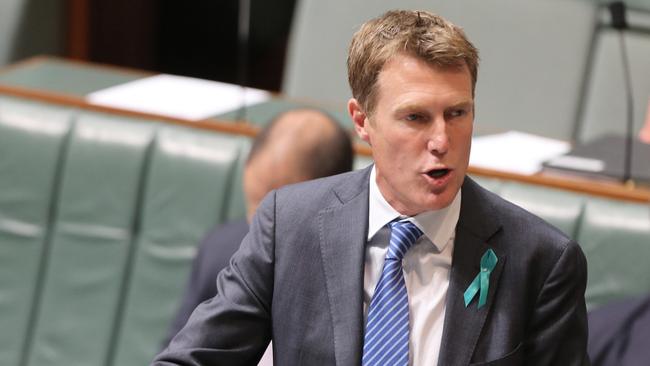Public servants risk being labelled corrupt, says Christian Porter
The Attorney-General has warned public servants could be declared corrupt under an anti-corruption watchdog.

Attorney-General Christian Porter has warned that hundreds of thousands of public servants, including journalists with the ABC and SBS, could be declared corrupt under proposed legislation to establish a federal anti-corruption watchdog.
The warning came as Scott Morrison backed the establishment of an anti-corruption commission in a tactical retreat to avoid having his new minority government’s numbers tested in the parliament, but he declared he would not be dictated to over the form the body would take.
Coalition MPs waved through a Labor motion in the House of Representatives yesterday that the government establish a commission, after previously agreeing to only consider the idea.
Mr Porter blasted a crossbench bill to create such a body — introduced by independent Cathy McGowan — saying it risked labelling public officials as corrupt “for the most minor of matters”.
He said any conduct by federal officials that impaired public confidence could potentially be considered as corrupt.
“Under section 8, any conduct of any person that directly or indirectly affected the impartial exercise of function of any person or group in the public service would be prima facie corrupt,’’ Mr Porter said.
He cited as an example a finding by the Australian Communication and Media Authority that ABC political editor Andrew Probyn had breached an impartiality requirement in the broadcaster’s code of conduct in a 2017 report describing Tony Abbott as the most “destructive politician of his generation”.
“Under this bill before the house, no ifs, ands or buts, Andrew Probyn would be found to have committed corruption,” Mr Porter said.
He said cabinet was considering what form any federal anti-corruption reforms would take, refusing to lay out a timetable for any reform.
The government opted not to challenge Labor’s motion calling for a national integrity commission amid fears Nationals MP Llew O’Brien could cross the floor, in what would have been a devastating blow to the government’s credibility in the hung parliament.
Mr O’Brien later told The Australian he wanted the Morrison government to create a federal ICAC but said he had concerns about Ms McGowan’s bill.
“The bill has to get it right. The powers have to be appropriate and the definition of corruption has to be right,” he said.
“I’ve met with the Attorney-General, and with Ms McGowan about some technical issues with her bill. What I really want is the Morrison government to establish a national integrity commission.”
Bill Shorten said the shift by the government yesterday was a “significant development”.
“Now of course, Australians do have the right to ask how sincerely and strongly the Prime Minister believes in a national integrity commission, or if he is just focused on protecting his job,” the Labor leader said. “Labor has been willing to co-operate in the national interest; it’s now time for the government to do the same.”
The Prime Minister said he was “not opposed” to measures to improve the integrity of public officials, and the government was considering “a range of options” on how to proceed. “We are following our process through the cabinet process and that’s how things should be done. We are not going to engage in half-baked ideas from the opposition,” he said.




To join the conversation, please log in. Don't have an account? Register
Join the conversation, you are commenting as Logout